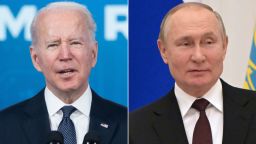As tensions rise between Russia and Ukraine, the role that the North Atlantic Treaty Organization plays in the region has come into focus.
Here’s what you need to know:
What is NATO? It is a European and North American defense alliance set up to promote peace and stability and to safeguard the security of its members. It was created as the Cold War escalated and is headquartered in Brussels, Belgium.
The aim of the United States-led alliance was to protect Western European countries from the threat posed by the Soviet Union and to counter the spread of Communism after World War II.
Which countries are in NATO?: Twelve founding countries — the United States, Canada, the United Kingdom, France and eight other European nations — signed the North Atlantic Treaty in 1949, pledging to protect each other by political and military means.
Over the decades since, the alliance has grown to include a total of 30 members.
In alphabetical order, they are: Albania, Belgium, Bulgaria, Canada, Croatia, Czech Republic, Denmark, Estonia, France, Germany, Greece, Hungary, Iceland, Italy, Latvia, Lithuania, Luxemburg, Montenegro, the Netherlands, North Macedonia, Norway, Poland, Portugal, Romania, Slovakia, Slovenia, Spain, Turkey, the UK and the US.
Ukraine is not a member of NATO, but has long hoped to join the alliance. This is a sore point for Russia, which sees NATO as a threat and vehemently opposes the move.
Amid recent tensions with the West, Russia has asked for iron-clad guarantees that the alliance won’t expand further east — particularly into Ukraine.
But the US and NATO have resisted those demands. The alliance has always had an “open door policy,” which states that any European country ready and willing to undertake the commitments and obligations of membership is welcome to apply for membership. Any decisions on enlargement of the alliance must be agreed unanimously.
Following the end of the Cold War, NATO made it clear it would welcome expansion to the east and in 1997, Czech Republic, Hungary and Poland were invited to begin accession talks.
Since then, more than a dozen countries from the former Eastern bloc, including three former Soviet republics, joined the alliance.
Despite the major geopolitical changes since NATO’s foundation, its stated purpose remains the same. The key principle underpinning the alliance is one of collective defense: “An armed attack against one or more of them in Europe or North America shall be considered an attack against them all.”
What does that mean in practice? The principle of collective defense is laid out in Article 5 of the North Atlantic Treaty. It guarantees that the resources of the whole alliance can be used to protect any single member nation. This is crucial for many of the smaller countries who would be defenseless without its allies. Iceland, for example, has no standing army.
Since the US is the largest and most powerful NATO member, any state in the alliance is effectively under US protection.
Read more about NATO and its role here.





























